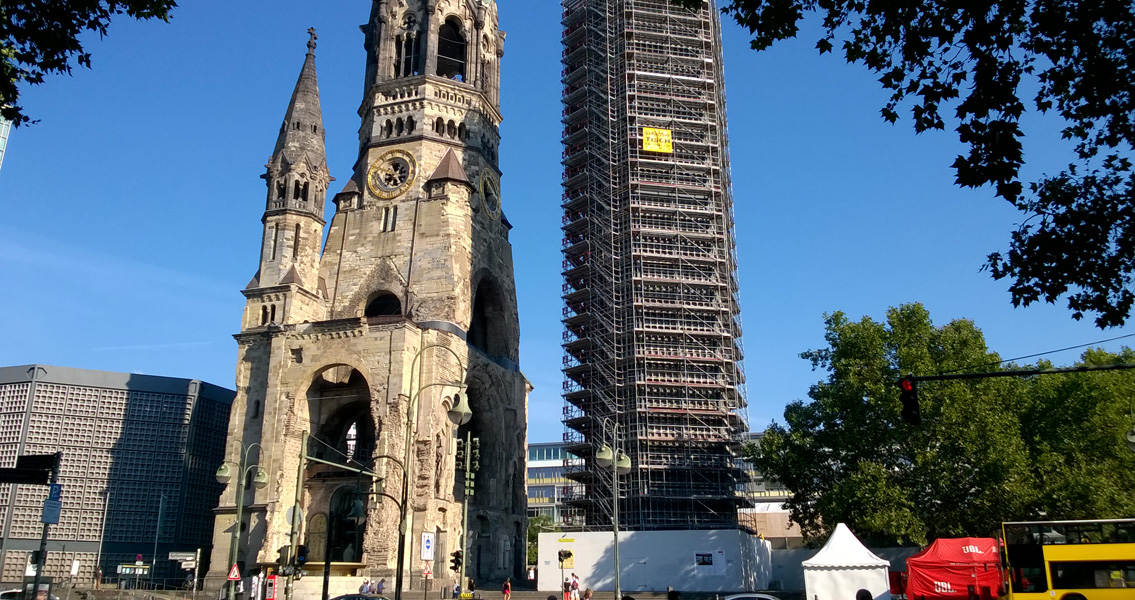Berlin - Germany
One of the most important ecclesiastical complexes in Germany, the Kaiser Wilhelm Memorial Church in Berlin serves as a reminder of the Second World War and is a must-see for any tourist visiting Germany’s capital. Restoration of the chapel meant ensuring its historic preservation while complying with current regulations and the technical necessities of concrete repair.
Name
Heritage-compatible restoration in Berlin
Country
Berlin - Germany
Categories
Products
One of the most important ecclesiastical complexes in Germany, the Kaiser Wilhelm Memorial Church in Berlin serves as a reminder of the Second World War and is a must-see for any tourist visiting Germany’s capital. Restoration of the chapel meant ensuring its historic preservation while complying with current regulations and the technical necessities of concrete repair. A major portion of the church ruins was torn down in the 1950s and replaced by three buildings designed by Egon Eiermann, one of the most significant German architects of the post-war modernist movement. The church complex includes not only the church itself but also the bell tower, the foyer and the chapel. The latter is a steelframed building clad with precast concrete components which proved to be particularly difficult and technically complex to maintain. Restoration had therefore become overdue.
A challenging task
With the help of the Wüstenrot charitable foundation, the restoration of the chapel, and particularly its façade, was taken from feasibility study to final decision in 2014. The façade consists of concrete honeycombs infilled with some 20,000 coloured thick-glass elements produced by a French glass artist, each of which unique in its own right and assembled together as fragments in the concrete moulds. The concrete quality of the 50 year old building was characterised by a very uneven washed concrete look with aggregates of up to 15 mm in size. The honeycomb construction itself exhibited a very intricate and finely defined geometry interspersed with inclined individual surfaces.

A sensitive, intricate approach was required in order to ensure the heritage-compatible restoration of the chapel and the façade of the Kaiser Wilhelm Memorial Church complex.
© MC-Bauchemie 2017
At the beginning of 2016, the architectural partnership abd ewerein und obermann sent out an invitation to bid for the restoration of the chapel, accompanied by the following repair system specifications: The appearance of the concrete was to remain largely unchanged, but with its water absorption capacity significantly reduced or completely eliminated. A carbonation-retarding coating was to be provided with as high an sd-value as possible, providing the maximum level of protection available. A sample area was to be renovated in situ, for which MC sales representative Thomas Baumgartner, and MC’s Sales Manager for Infrastructure and Industry, Oliver Krause of our Berlin Service Centre, suggested a system complex comprising hydrophobic Emcephob WM combined with a protective coating of MC-Color Proof pro. The latter product easily met all the specified requirements. This transparent concrete protective coating is water repelling yet also offers good vapour diffusion and highly effective carbonation-retarding properties. The product is classified as compliant with the non-trafficable surface protection class OS-B as listed by the Federal Highways Research Institute (BASt). All the material specimens were subjected to a rainstorm test with rear moisture penetration in a trial comprising 50 test cycles, conducted by the Federal Institute for Material Research and Testing (BAM). Completed by the end of June 2016, the laboratory tests provided clear evidence that the multi-component system offered by MC was the most technically reliable and visually attractive of all those examined.
Implementation
The application work was carried out by the firms A&M restore and Repenning + Sohn Bauwerkserhaltung of Berlin and successfully executed by the autumn of 2016. All the accompanying construction activities in the interior were completed by spring 2017, allowing normal church business to be resumed without disruption.
We are continuously improving our website and we use cookies for this purpose. For an optimal user experience, we recommend that you accept them. Otherwise, parts of the page will be deactivated in the display in accordance with data protection regulations.